story
The Art of Translation
"Authors create national literature, but translators produce universal literature." José Saramago
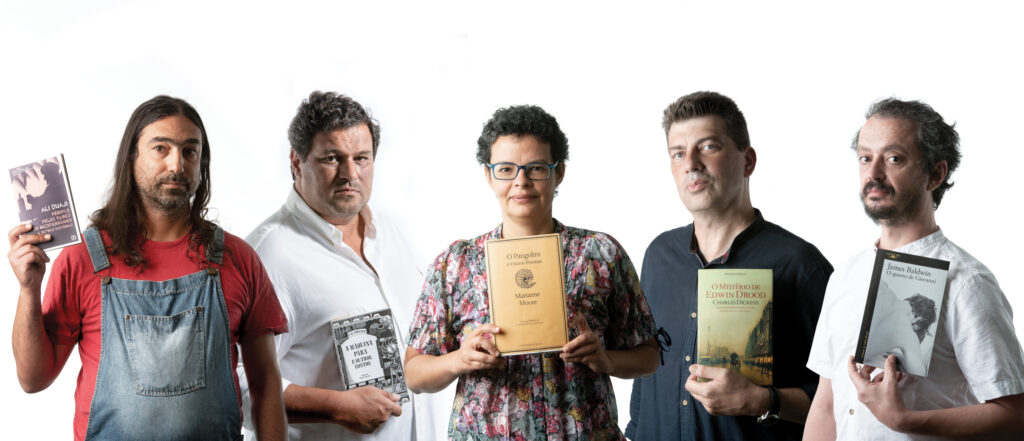
The Lisbon Book Fair is back in Parque Eduardo VII for its 90th edition, from August 27 to September 13. Agenda Cultural celebrates the event by paying tribute to a literary activity which, although essential in the book production chain and in creating a bond between authors and readers from different language milieus, usually goes unnoticed. The quality of the work of the five guest translators categorically contradicts the old Italian aphorism: traduttore, traditore.
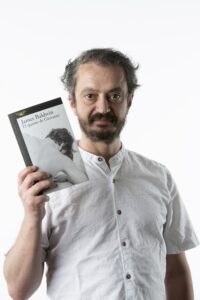
Valério Romão
Valério Romão spent a large part of his professional life working on computer science. The writer, who graduated in philosophy, became a translator thanks to his passion for reading and writing and “the desire to see in Portuguese a certain text that has not yet been translated. Trying to do what other translators did before me, to incorporate the voice of a certain author in Portuguese culture, making him or her known.” Born in France, where he lived until he was 10, he has a natural ability to translate from French, but he also translates from English – “with the help of a dictionary.” He translates a lot of unpublished poetry. “These are translations that I keep in my drawer and that I do for pleasure, and which I eventually show to a publisher. I am translating the book La main hantée, by the Canadian poet Louise Dupré, who writes in French. I admire her poetry, which I discovered in a French bookstore. I sent her a message saying that I would love to translate the book, adding that I couldn’t pay for the copyright because no publisher would bear the cost. Publishing poetry in Portugal is something you do with print runs of 100 copies and without money. She was very pleased. She said she wasn’t in poetry for the money and was delighted with the idea of an author entering a bookstore, reading her book, and then wanting to translate it and making it known.” Valério Romão’s most recent translation, James Baldwin’s O Quarto de Giovanni (Giovanni’s Room), “was a serendipitous opportunity offered by the publisher for which I had already translated Houellebecq. It was an honor because he is a tremendous author, not only for his literary value, but for all his contributions to the fight for human rights, especially of blacks and homosexuals. It is a very risky book from the 50s, beautifully written by a black homosexual man, with no speech ambiguity at all. Baldwin is one of those authors that make you think, ‘I wish I had met this guy!’ He has amazing courage and clear-sightedness.” As for the work, Romão states that the language in the book is not particularly complex: “A bit in the vein of Hemingway, an expatriate, short sentences, but with a different topic and a different emotional density.” Asked if it is difficult to transpose this simplicity of style into a translation, he says: “It depends on whether the apparent simplicity of the author is just another effect or not. In Baldwin’s case, there is great honesty in the way he writes.” And he concludes with a grievance: “Translators are very poorly paid in Portugal. If you consider the time it requires, the quality you demand from yourself, what you actually get after paying you taxes – this is something you do only for the love of it, or because you don’t know how to do anything else.”
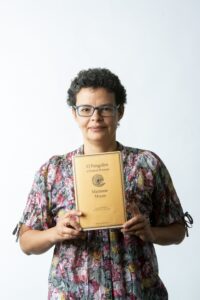
Margarida Vale do Gato
Margarida has a degree in Modern Languages and Cultures, but her encounter with translation began before she went to college. At the age of thirteen she moved with her family to California, where she stayed while her father was doing his master’s degree. “I already loved languages back then. I used to wonder how people thought in different languages. I enrolled in a local school, and after a few months I started dreaming in English. This brightened up my days, which were a bit lonely because it’s not easy to move to another country at that age. I knew I would be coming back to Portugal soon, so I also started learning French. But it was very rudimentary, so I invested in self-learning by listening to Jacques Brel. My very first translations were of Brel’s lyrics. I soon realized that this was an activity in which I felt really comfortable.” She does not translate from French at this point, unless it is a poem – “not because it’s easier, but because there’s a concentration in words that requires a different kind of attention, one that does not involve the language’s everyday use. To translate novels you constantly have to watch TV shows, which I don’t particularly like, or movies, which I watch more often. Or you have to constantly go to countries where the language is spoken, in the variant you translate from, otherwise things will sort of freeze. Literature is a mechanism of language innovation where you can follow the latest rumors.” Margarida is preparing an anthology of Beat poetry with Nuno Marques and will now bring us a book by Marianne Moore, O Pangolim e Outros Poemas (The Pangolin and Other Poems), which is “the only proposal I ever made to the publisher. I really wanted to translate this book. I am a professor of American Literature and what I like about modernism is authors who experiment. In terms of poetry, I really like to risk understanding the experience through translation. Marianne Moore is a poet who combines curiosity for small lives (the pangolin, a creature that has been greatly abused by our pandemic, or a nectarine and a strawberry, for instance) with the awareness that the act of knowing depends upon previous representations – but of which she seeks to present a different angle through the cadence of language. As an author, she offers a degree of attention to the represented object that goes beyond the realm of the self. My poetry tends to be personal and to play with autobiography in a way that I continue to pursue because I find it interesting, but which she rejects.” With regards to translation, she believes that “it’s very difficult to work with certain kinds of systematization because some texts afford greater literality, which is important to retain their style and strangeness. On other occasions, you have to adapt them. So when it comes to consistency in translation, we should be suspicious of it. We must risk contradicting ourselves, because the unity of the text is something that translation inherently denies.”

Miguel Martins
A non-practicing archaeologist, Miguel Martins started being invited by publishers to work as a translator by virtue of being a poet. Although he also works as a critic for Gulbenkian’s Colóquio/Letras magazine, translation pays most of his bills. He translates from French, English and Spanish and has translated a booklet from Italian – Luigi Russolo’s Manifesto da Música Futurista (better known in English as The Art of Noises), which “was something I did out of love, and it was slower than it would be if I had a real command of the language. I translate all kinds of stuff to make a living, horrible books, self-help books, and so on. Every now and then I get to translate really good things, like Forster or Lorca’s Mariana Pineda, as well as a lot of poetry for literary magazines. Regarding his latest translation – E. M. Forster’s A Máquina Pára e Outros Contos (The Machine Stops and Other Stories), a collection of texts written over a period of 20 years – Miguel Martins says: “To motivate readers I would basically talk about the short story mentioned in the title, a truly fantastic text, written a hundred years ago, which predicts with surprising accuracy many aspects of the current world and its dystopian traits – communication through machines only, people feeling distant from one another, an internet of sorts, and things such as likes on Facebook.” Regarding the job of a translator, he states that “Command of the source language is much less important for a good translation (with more or less work you get there) than command of the target language. At the end of the day, what people read must be written in good Portuguese. That’s why I think that, whenever possible, literary translations should be done by authors. But besides that, translation also implies culture and all sorts of references – historical, scientific, artistic, political. This is where many translations fail. And it is for this reason – although there are some exceptions – that I have serious doubts about the possibility of being a great translator at a young age. Professional translators never know what kind of work they will get next, so this culture should be as comprehensive as possible, notwithstanding the research required in each case. You can’t make a living solely by translating good things. The rates in Portugal are the same whether you’re translating Shakespeare or a Spice Girls biography. But while I can translate 15 pages a day from a crappy book, with a Shakespeare work I will probably not be able to do more than seven lines. Translators who only translate really interesting things either have other sources of income or can’t make ends meet. For me, the problem with this work are the interruptions, the gaps between this translation and the next. If I were working all the time – which is not desirable, as it is very exhausting from a mental point of view, and also because sometimes I need to break free from the style and language of an author before moving on to the next one – it would be a relatively well paid job.”
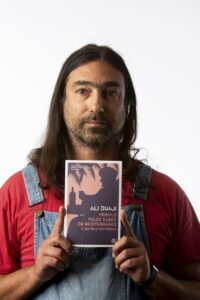
Hugo Maia
“I started learning Arabic very casually. I had spent holidays in Morocco and I was curious about the language. We understand Spanish, we speak English, but we do not understand the language of a neighboring country which we perceive as being totally different.” Hugo Maia then enrolled in a free Arabic course at Faculdade de Letras and read a lot about the history of the Arab world and the Islamic presence in Portugal. As he was the best student in class, he got a scholarship for a summer crash course in Tunisia. “I realized that in order to learn Arabic, I would have to do it in an Arab country. It was the best way to learn both standard Arabic and colloquial Arabic, so I decided to enroll in the annual crash course in Tunis. In fact, I’m a graduate in anthropology, and I interrupted my degree in 2001/02 to take this course. I’m not an expert in literature. First and foremost, I consider myself a reader. Sometimes I would compare translations from Arabic to French, so I took an interest in translation theory. I realized that there were practically no direct translations from Arabic in Portugal. In 2006 I submitted some translation projects to several publishers, which were refused. Which was fortunate, as my knowledge was not that great. Arabic is not a particularly difficult language, but it is very complex from a sociolinguistic point of view – it has what we call a very pronounced diglossia. There is a standard form of Arabic, which is the same in all Arab countries, and a colloquial form, which is different in every country and even in every region. The differences between the various colloquial Arabic languages are as great as those between Portuguese, Italian, and Romanian. I usually say that in order to learn Arabic well you have to know two languages – standard Arabic and at least one colloquial Arabic language. In the meantime, I lived in Morocco for five years, where I learned colloquial Moroccan Arabic, which helped me translate One Thousand and One Nights, a work that includes many colloquial Arab idioms from the Levant, Syria and Egypt, although these are very different.” When Hugo entered a bookshop in Tunis and discovered Jaoulet Baina Hanet Al Bahr Al Abyadh Al Motawasset (translated in Portuguese as Périplo pelos Bares do Mediterrâneo, which could be translated as A Tour of Mediterranean Bars), he did not know that Ali Duaji was regarded as the founding father of the Tunisian short story. He was fascinated by the author’s irony and sarcasm, which in the 1930s “satirized the new bourgeois classes that were working hand in glove with the political power of the French protectorate, resulting in that very confusing mixture of customs.” But according to him, his latest translation is first and foremost a very peculiar travel account. “A tour of the bars of Europe and Asia that ignores traditional tourist attractions such as museums.” He says he can relate with that and even gives a “shameful” example: he lived for a month right next to the Van Gogh museum in Amsterdam and never once visited it. “And I love the painter. I’ve seen his paintings at the Musée d’Orsay!”
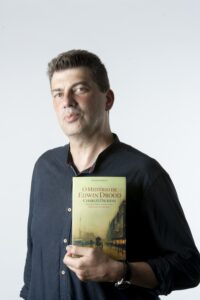
Paulo Faria
After graduating in Biology, the writer and literary translator Paulo Faria spent some time teaching that subject, but it was “clearly” not what he liked. His grandfather was a language teacher at Colégio Militar and taught him English and French at a very young age. His never lost his passion for literature, which he explored as a self-taught person, and when the opportunity to work on literary translation arose, he did not bail out. He translates from French, but mostly from English. He has translated Emily Brontë, Jane Austen and Charles Dickens, but he points out that when people mention this aspect of his life, they usually refer to him as “the translator of Cormac McCarthy” – an author he particularly admires and from whom he has translated twelve books. “I translated three of them twice from scratch because I found the result of the first translations really annoying when I happened to read them a few years later: Blood Meridian, The Orchard Keeper and Child of God.” The Portuguese Society of Authors presented him with the International Literary Translation Award in 2015 for his translation of Dickens’ A Tale of Two Cities , and perhaps because of that his name is usually associated with the great classics. His most recent translation is also of a Dickens work – The Mystery of Edwin Drood. This is Dicken’s final novel, and it was left unfinished because the author died while writing it. Because of that, it has “this bizarre thing of being a crime novel in which the mystery remains unsolved. The mystery mentioned in the title thus becomes a double mystery.” Paulo mentions Dire Quasi la Stessa Cosa, a text in which “Umberto Eco argues that a translation can never say the same thing, but if the translator is good it can say almost the same thing. Eco defines translation as an interpretation based on a negotiation. I agree with him. When you are translating an author like Dickens, you must understand what his coevals felt when reading that text – which was natural for them, although not everyone spoke like that – and then try to create a natural artificiality. We cannot replicate the language of that era in Portuguese, nor does a contemporary reader want that. A good translation should reach out to the reader without distorting the original. It’s precisely because of this that translations get old. Every generation translates Dickens or Victor Hugo because our world is no longer their world, but it is not the world of translations from the 1940s either. As an author, when I write a novel, I don’t think about the readers. But as a translator, I always do.